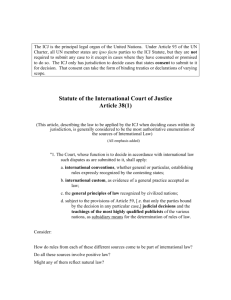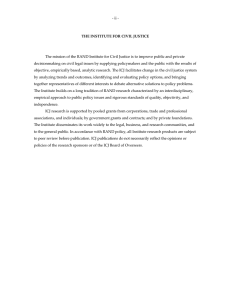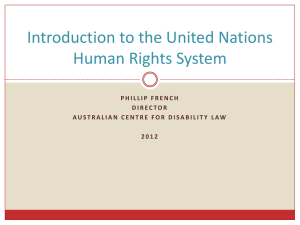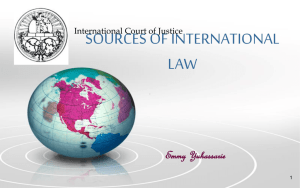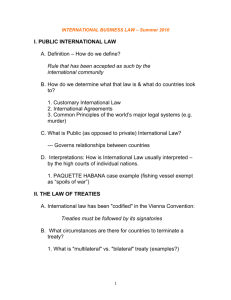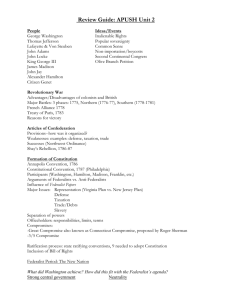My Way or No Way: The American I. I
advertisement
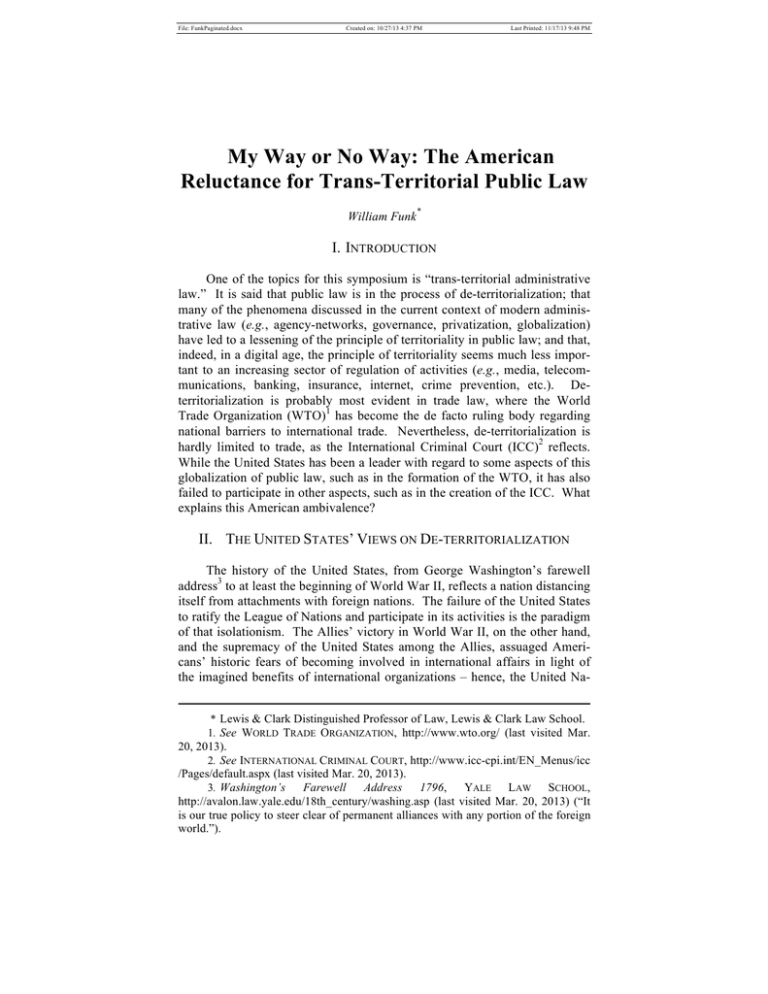
File: FunkPaginated.docx Created on: 10/27/13 4:37 PM Last Printed: 11/17/13 9:48 PM My Way or No Way: The American Reluctance for Trans-Territorial Public Law William Funk * I. INTRODUCTION One of the topics for this symposium is “trans-territorial administrative law.” It is said that public law is in the process of de-territorialization; that many of the phenomena discussed in the current context of modern administrative law (e.g., agency-networks, governance, privatization, globalization) have led to a lessening of the principle of territoriality in public law; and that, indeed, in a digital age, the principle of territoriality seems much less important to an increasing sector of regulation of activities (e.g., media, telecommunications, banking, insurance, internet, crime prevention, etc.). Deterritorialization is probably most evident in trade law, where the World Trade Organization (WTO)1 has become the de facto ruling body regarding national barriers to international trade. Nevertheless, de-territorialization is hardly limited to trade, as the International Criminal Court (ICC)2 reflects. While the United States has been a leader with regard to some aspects of this globalization of public law, such as in the formation of the WTO, it has also failed to participate in other aspects, such as in the creation of the ICC. What explains this American ambivalence? II. THE UNITED STATES’ VIEWS ON DE-TERRITORIALIZATION The history of the United States, from George Washington’s farewell address3 to at least the beginning of World War II, reflects a nation distancing itself from attachments with foreign nations. The failure of the United States to ratify the League of Nations and participate in its activities is the paradigm of that isolationism. The Allies’ victory in World War II, on the other hand, and the supremacy of the United States among the Allies, assuaged Americans’ historic fears of becoming involved in international affairs in light of the imagined benefits of international organizations – hence, the United Na* Lewis & Clark Distinguished Professor of Law, Lewis & Clark Law School. 1. See WORLD TRADE ORGANIZATION, http://www.wto.org/ (last visited Mar. 20, 2013). 2. See INTERNATIONAL CRIMINAL COURT, http://www.icc-cpi.int/EN_Menus/icc /Pages/default.aspx (last visited Mar. 20, 2013). 3. Washington’s Farewell Address 1796, YALE LAW SCHOOL, http://avalon.law.yale.edu/18th_century/washing.asp (last visited Mar. 20, 2013) (“It is our true policy to steer clear of permanent alliances with any portion of the foreign world.”). File: FunkPaginated.docx 414 Created on: 10/27/13 4:37 PM MISSOURI LAW REVIEW Last Printed: 11/17/13 9:48 PM [Vol. 78 tions, the North Atlantic Treaty Organization, and the General Agreement on Tariffs and Trade.4 The United States’ leadership in the creation of these organizations, however, was aligned with the United States’ perceived ability to both dominate these entities and to be their primary beneficiary. As the leader of the “Free World” and the unchallenged economic master of the world, the United States stood to gain the most by creating global organizations that reflected its view of the world. However, despite the fact that the United States is now the undisputed predominant military power in the world, enabling it to project military power to every continent, it has seen its leadership of the “Free World” in many respects decline with the rise of the European Union (EU) as a political entity of its own. Moreover, with the EU surpassing the United States in Gross Domestic Product and China closing in,5 the economic supremacy of the United States can no longer be taken for granted. Thus, it should be no surprise that the United States’ enthusiasm for undertaking new international obligations – when it would not be the unchallenged leader – would lessen. Indeed, as its influence waned, the United States even began to cut its financial support of the United Nations.6 In 1985, the United States withdrew from the general jurisdiction of the International Court of Justice (ICJ),7 and in 2005, it withdrew from the Optional Protocol to the Vienna Convention on Consular Relations Concerning the Compulsory Settlement of Disputes.8 The United States’ efforts now to avoid involvement with international obligations or organizations are further evidenced by the number of interna4. The United Nations was founded in 1945 by 51 nations. UN at a Glance, UNITED NATIONS, http://www.un.org/en/aboutun/index.shtml (last visited Sept. 24, 2013). NATO was created in 1949 by the United States, Belgium, the Netherlands, Luxembourg, France, the United Kingdom, Canada, Portugal, Italy, Norway, Denmark, and Iceland. NATO, WIKIPEDIA, http://en.wikipedia.org/wiki/NATO (last visited Sept. 24, 2013). The GATT was signed and put into effect in 1947 by 23 countries. General Agreement on Tariffs and Trade, WIKIPEDIA, http://en.wikipedia.org /wiki/General_Agreement_on_Tariffs_and_Trade (last visted Sept. 24, 2013). 5. The World Factbook, CIA, https://www.cia.gov/library/publications/theworld-factbook/fields/2195.html (last visited Mar. 20, 2013). 6. See MARJORIE ANN BROWNE, CONG. RESEARCH SERV., RL 33611, UNITED NATIONS SYSTEM FUNDING: CONGRESSIONAL ISSUES 2 (2013), available at http://www.fas.org/sgp/crs/row/RL33511.pdf. 7. Letter and Statement Concerning Termination of Acceptance of ICJ Compulsory Jurisdiction from George P. Shultz, U.S. Dep’t of State, to Secretary General, of Int’l Court of Just. (Oct. 7, 1985), reprinted in 24 I.L.M. 1742 (1985). 8. Optional Protocol to the Vienna Convention on Consular Relations Concerning the Compulsory Settlement of Disputes, n.1, U.N. TREATY COLLECTION, http://treaties.un.org/Pages/ViewDetails.aspx?src=TREATY&mtdsg_no=III8&chapter=3&lang=en (last visited Mar. 20, 2013) (the protocol provides for jurisdiction in the ICJ when any state party to the Vienna Convention on Consular Relations seeks to sue another state party for violating it). File: FunkPaginated.docx 2013] Created on: 10/27/13 4:37 PM MY WAY OR NO WAY Last Printed: 11/17/13 9:48 PM 415 tional conventions the United States has failed to ratify in recent years: The Convention on the Rights of the Child,9 the Convention on the Elimination of All Forms of Discrimination against Women,10 the International Covenant on Economic, Social and Cultural Rights,11 The Convention on the Prohibition, Use, Stockpiling, Production and Transfer of Anti-Personnel Mines and on Their Destruction,12 The Kyoto Protocol,13 The International Criminal Court,14 and the Convention on the Law of the Sea.15 Even when the United States has ratified a convention, it has often established reservations, understandings, or declarations that fundamentally undermine the convention. For example, when the United States ratified the International Covenant on Civil and Political Rights,16 it declared that the treaty was not self-executing and therefore had no domestic legal effect.17 This declaration led the Human Rights Committee of the UN in 2006 to criticize the United States for material non-compliance.18 While the United States does not always explicitly explain the reasons for not ratifying (or fully adopting) these conventions, a continuing concern has been that ratification would be inconsistent with the sovereignty and constitutional structure of the United States.19 That is, there is a belief that the international bodies that implement and interpret these conventions should not be empowered to define the rights of Americans or to alter the social and economic priorities established by their elected represen9. Convention on the Rights of the Child, G.A. res. 44/25, annex, 44 U.N. GAOR Supp. (No. 49) at 167, U.N. Doc. A/44/49 (1989) (Sept. 2, 1990). 10. United Nations Convention on the Elimination of All Forms of Discrimination Against Women, Sept. 3, 1981, 1249 U.N.T.S. 13. 11. International Covenant on Economic, Social, and Cultural Rights, G.A. Res. 2200A (XXI), U.N. Doc. A/6316 (Jan. 3, 1976). 12. Convention on the Prohibition of the Use, Stockpiling, Production and Transfer of Anti-Personnel Mines and on their Destruction (Mar. 1, 1999). 13. Kyoto Protocol to the United Nations Framework Convention on Climate Change, U.N. Doc. UNFCCC/CP/1997/L.7/Add.1 (Feb. 16, 2005). 14. The Rome Statute of the International Criminal Court , U.N. GAOR, 53d Sess, U.N. Doc.A/CONF. 183/9 (1998). 15. United Nations Convention on the Law of the Sea, Dec. 10, 1982, 1833 U.N.T.S. 397. 16. International Covenant on Civil and Political Rights, Dec. 19, 1966, 999 U.N.T.S. 171. 17. 138 CONG. REC. S4783 (daily ed. Apr. 2, 1992) (stating for the record five reservations, understandings, and declarations attendant to the United States Senate’s ratification). 18. See Rep. of the Human Rights Comm., 60th Sess., U.N. Doc. A/61/40, at 5867; U.N. GAOR, 60th Sess., Supp. No. 40 (2006), available at http://www.ccprcentre .org/doc/ICCPR/AR/A_61_40_vol.I_E.pdf. 19. See, e.g., Jim Abrams, Disability Treaty Downed by Republican Opposition, HUFFINGTON POST (Dec. 4, 2012), http://www.huffingtonpost.com/2012/12 /04/disability-treaty_n_2238181.html (reporting Republican opposition to disability treaty because it could pose a threat to U.S. national sovereignty). File: FunkPaginated.docx 416 Created on: 10/27/13 4:37 PM MISSOURI LAW REVIEW Last Printed: 11/17/13 9:48 PM [Vol. 78 tatives. For example, the Human Rights Committee of the Covenant on Civil and Political Rights found that, among other faults, the United States failed to provide adequate political rights to the citizens of the District of Columbia, failed to provide adequate civil rights to those imprisoned in maximum security prisons, and failed to eliminate de facto segregation in schools.20 Clearly, decisions as to whether citizens of the District of Columbia should be able to be represented by Senators and Congressman, what civil rights hard core criminals should have in prison in the United States, and how the public schools in the United States should be organized and funded should be made through the American political and legal process, not dictated by an international organization made up of representatives from foreign nations. It is undeniable that “conservatives” in the United States have a greater antipathy to foreign organizations and their ability to influence policy in the United States, much less their ability to dictate law in the United States. At the present, the nation is split between the liberal/social political views generally held by Democrats, which are not generally at odds with the political and social views of other economically developed nations, and the individualistic/religious-moral views generally held by Republicans, which are uniquely American. This uniquely American individualistic/religious-moral view is epitomized by the country’s continued support of the death penalty and its embrace of the individual right to have handguns. Moreover, there is still deep disagreement about the role of the federal government as compared to that of the states. Therefore, it is not surprising that there is even greater debate about the role of any international government as compared to the United States government. It is not only the political branches of government that reflect a distrust of foreign entities dictating law to the United States, but also the courts. Some members of the Supreme Court of the United States have famously (or infamously) expressed their unwillingness to look to foreign law to guide their decisions interpreting the Constitution or federal statutes.21 This unwillingness reflects those members’ views that interpretation of the Constitution must be according to its original meaning, which would not include the current views on similar matters held by other nations and their courts. More directly, the Supreme Court of the United States recently had occasion to address the effect of decisions of the ICJ on American law. In Medellin v. Texas, a Mexican national was arrested, tried, convicted, and sentenced to death in a Texas court, all without having been informed of his right to seek assistance from the Mexican consul and without the consul having been in20. Rep. of the Human Rights Comm., 60th Sess., U.N. Doc. A/61/40, at 62, 65, 67. 21. See, e.g., Lawrence v. Texas, 539 U.S. 558, 598 (2003) (Scalia, J., dissenting) (arguing that the Court should not eliminate criminal sanctions on certain behavior because foreign nations have done so); Foster v. Florida, 537 U.S. 990, 990 (2002) (Thomas, J., concurring) (positing that the Court “should not impose foreign moods, fads, or fashions on Americans.”). File: FunkPaginated.docx 2013] Created on: 10/27/13 4:37 PM MY WAY OR NO WAY Last Printed: 11/17/13 9:48 PM 417 formed of Medellin’s arrest.22 Both of these omissions are violations of the Vienna Convention on Consular Relations to which the United States is a party.23 Medellin, however, only raised this issue in his motions for postconviction relief, not in the trial or on direct appeal.24 As a result, under longstanding Texas law, his motions were dismissed on the grounds that the claim was procedurally defaulted because they were not raised on direct review.25 The ICJ, however, in a case brought by other Mexican nationals similarly denied their rights under the Convention and similarly barred from raising the issue in motions for post-conviction relief, held that the United States was “required to review and reconsider the convictions and sentences of the [affected] Mexican nationals” notwithstanding any state procedural default rules.26 The first question the ICJ’s decision raised was whether its decision was directly enforceable in United States courts.27 The Supreme Court, by a 6-3 vote, held that it was not.28 The Constitution states that treaties, like the Constitution and federal laws, are the supreme law of the land and therefore trump state laws, including state procedural default rules. The earliest decisions of the Court, however, distinguished between treaties that are selfexecuting – that is, they need no legislative action to make them effective as domestic law – and those that are not – that is, they require Congress to pass laws to make them effective as domestic law.29 In Medellin there were three treaties in question – the Optional Protocol (to the Convention on Consular Relations) Concerning the Compulsory Settlement of Disputes, the United Nations Charter, and the ICJ Statute adopted by the United Nations to establish the ICJ.30 In accepting the Optional Protocol, “the United States agreed to submit disputes arising out of the Vienna Convention to the ICJ.”31 The Court, however, concluded that agreeing to submit disputes to the ICJ did not mean agreeing to be bound by the ICJ’s decisions.32 Article 94(1) of the Charter states that each member “undertakes to comply with the decision of the [ICJ] in any case to which it is a party.”33 The Court explained that this language did not contemplate a requirement that members enforce the judg- 22. 23. 24. 25. 26. 27. 28. 29. 30. 31. 32. 33. 552 U.S. 491, 499, 501 (2008). Id. Id. at 501. Id. Id. at 502-03 (alteration in original). Id. at 498-99. Id. at 504. Id. at 504-05. Id. at 506. Id. at 507. Id. Id. at 508 (quoting U.N. Charter art. 94). File: FunkPaginated.docx 418 Created on: 10/27/13 4:37 PM MISSOURI LAW REVIEW Last Printed: 11/17/13 9:48 PM [Vol. 78 ments of the ICJ; it merely indicated a commitment by members to take some unspecified future action.34 Finally, the ICJ statute by its terms indicates that the ICJ is a forum to arbitrate disputes between nations, here Mexico and the United States.35 The Supreme Court interpreted this to mean that the judgment of the ICJ did not create a legal right in Medellin to have his claim decided by the Texas court, even though that is what the ICJ declared.36 Without belaboring the arguments on both sides, suffice it to say that the language of these international agreements could have been read differently. Instead, the Court chose to read the agreements restrictively so that they were not self-executing, and therefore, the ICJ’s judgment had no domestic legal effect.37 The Court’s interpretation of these agreements suggests that only the clearest indication in the language of a treaty would enable it to be considered self-executing. A critical concern expressed by the Court was that if a decision of the ICJ could be enforceable in federal and state courts, it would eliminate the option of noncompliance . . . , undermining the ability of the political branches to determine whether and how to comply with an ICJ judgment. Those sensitive foreign policy decisions would instead be transferred to state and federal courts charged with applying an ICJ judgment directly as domestic law. And those courts would not be empowered to decide whether to comply with the judgment – again, always regarded as an option by the political branches – any more than courts may consider whether to comply with any other species of domestic law.38 This concern reflects the important national policy that compliance with foreign obligations, including legal obligations, should be left to the political branches of the United States government. Decisions of international courts and organizations are not to be part of domestic law except as expressly provided by domestic legislation. There is an interesting juxtaposition between Medellin and the seminal case of Martin v. Hunter’s Lessee.39 In that case, the Supreme Court in an appeal from the highest court in the state of Virginia had interpreted a treaty with Great Britain and directed the state court to enter judgment in the state case in accordance with the Supreme Court’s interpretation.40 The Virginia court balked at this direction on the grounds that it was a separate sovereign Id. at 508. Id. at 511. Id. at 511-12. See id. at 551 (Breyer, J., dissenting) (arguing that the relevant treaty provisions are self-executing as applied to the ICJ judgment). 38. Id. at 511 (majority opinion). 39. 14 U.S. 304 (1816). 40. Id. at 313. 34. 35. 36. 37. File: FunkPaginated.docx 2013] Created on: 10/27/13 4:37 PM MY WAY OR NO WAY Last Printed: 11/17/13 9:48 PM 419 and could not be directed by a court of a different sovereign (the Supreme Court of the United States) anymore than it could be directed by the House of Lords as to its interpretation of the treaty.41 On appeal from that decision, the Supreme Court expounded on the theory that the Constitution had submitted Virginia to the Supreme Court’s supremacy as to matters of federal law, including treaties.42 One could imagine the Medellin Court’s decision as equivalent to that of the Virginia court in Hunter’s Lessee, rejecting the notion of a court of a different sovereign (the ICJ) being able to direct the law in courts of the United States. Just as Virginia’s highest court did not read the Constitution as divesting it of its role as the final authority of the law applicable in the state of Virginia, the Court in Medellin explicitly stated that the applicability of the ICJ’s judgments was for the Supreme Court to decide, not the ICJ.43 In many ways, the Court’s decision in Medellin regarding the relation between decisions by international courts and organizations and domestic law is not surprising. Nevertheless, it clearly signals a reluctance, if not outright hostility, to acceptance of some sort of global public law enforceable in domestic courts. In short, international law in United States courts largely remains a political, not a legal, argument. Ultimately, the United States Constitution itself creates a barrier, or at least a limit, to the de-territorialization of law in the United States. That is, even if the President of the United States were to make a treaty and the Senate were to ratify it as self-executing, federal and state courts would still be required to determine whether that treaty violated constitutional requirements. First, there may be some question as to whether there is a substantive limitation on the positive authority of the United States to enter into treaties, as there is in terms of domestic legislation. Congress can only legislate with respect to matters specified in the Constitution, largely what appears in Article I, Section 8. In Missouri v. Holland, the Court made clear that the Necessary and Proper Clause may be used as authority to pass a law to carry into execution a treaty even though that law would not otherwise have been within Congress’s legislative authority. 44 Nevertheless, there are intimations in that case, as well as in an earlier case,45 that the national treaty power might be limited to matters of “national interest”46 or “properly the subject of negotiation with a foreign country.”47 See id. at 321-22. Id. at 328, 334. Medellin, 552 U.S. at 506. 252 U.S. 416 (1920). See De Geofroy v. Riggs, 133 U.S. 258 (1890) (upholding the validity of a treaty with France allowing citizens of one country to inherit property from citizens of the other country). 46. Holland, 252 U.S. at 435. 47. De Geofroy, 133 U.S. at 267. 41. 42. 43. 44. 45. File: FunkPaginated.docx 420 Created on: 10/27/13 4:37 PM MISSOURI LAW REVIEW Last Printed: 11/17/13 9:48 PM [Vol. 78 While courts may be expected to be highly deferential to the President and the Senate in determining whether a particular treaty meets those vague requirements, one might well imagine an international convention that could test those limits. For example, imagine an international convention creating an international right of women to be protected from domestic violence, and imagine that Congress passes a law to implement that convention by making it a federal crime for persons to subject women to domestic violence. The Supreme Court has already held that a federal law that created a federal private damages remedy for persons who engage in gender motivated violence was unconstitutional as beyond Congress’ powers.48 And here, while such an international convention is certainly plausible, it is less clear why or how this subject – domestic violence wholly within the borders of one of the states – is “properly a subject of negotiation with a foreign country.” Or imagine an international convention declaring capital punishment a violation of international human rights, and imagine a Congress that passes a law implementing that convention by making capital punishment unlawful in the states. Again, absent such a treaty, Congress would almost certainly not have the power to make such a law, and, again, it is not clear why capital punishment carried out in one of the states as a general matter is “properly a subject of negotiation with a foreign country.” Even if the Court found that as a facial matter a treaty might be valid, a law passed by Congress to enforce that treaty might in an “as applied” challenge be found unconstitutional. That issue is currently before the Supreme Court in Bond v. United States.49 In this case a woman tried to poison a friend who was pregnant with a child fathered by the woman’s husband by putting a poison on the other woman’s mailbox.50 Because that poison, which caused only a minor rash on the victim, was a toxic chemical, Ms. Bond was prosecuted under a statute prohibiting the use of a “chemical weapon,” a statute enacted by Congress to implement the 1993 Chemical Weapons Convention.51 The question raised is whether a law passed by Congress to implement a treaty can be constitutionally applied in a situation having no connection to a matter “properly a subject of negotiation with a foreign country.”52 If the answer is no, this decision would provide another barrier or restriction on United States enforcement of international conventions. There is a second, and more likely, potential constitutional problem with United States enforcement of possible international conventions. It is widely accepted that the rights afforded persons in the United States by the Constitu- 48. See United States v. Morrison, 529 U.S. 598 (2000). 49. 133 S. Ct. 978 (2013) (granting cert.). 50. See United States v. Bond, 581 F.3d 128, 131-32 (3d Cir. 2009), rev’d, 131 S.Ct. 2355 (2011). 51. Id. at 132. 52. See id. at 134. File: FunkPaginated.docx 2013] Created on: 10/27/13 4:37 PM MY WAY OR NO WAY Last Printed: 11/17/13 9:48 PM 421 tion cannot be abridged by treaty.53 In the United States, the First Amendment’s protection of Free Speech extends to speech that demeans a group on racial or religious grounds.54 Nevertheless, as recently as 2010, the United Nations Human Rights Council passed a resolution that condemned defamation of religion.55 An international convention requiring prohibition of such defamation is not unthinkable, but it would clearly be unconstitutional and therefore unenforceable in the United States. It might be noted that the United States is not alone in insisting that its national constitution trumps international agreements. The German Constitutional Court, in a case concerning Germany’s ability to enter into the Lisbon Treaty (which expands the authority of the European Union), specified a number of areas in which Germany’s Basic Law limits the ability of the nation to cede its sovereignty to the EU.56 This pushback against deterritorialization has been sporadic among the EU states, but it is endemic in the United States. III. CONCLUSION De-territorialization of public law is in direct tension with notions of strong federalism. In the American version of federalism, the territoriality of the law is of great importance, which is one reason why choice of law questions are both interesting and challenging. The Erie doctrine57 likewise reflects the importance of the territoriality of state law even in federal courts. Moreover, the fact that the United States continues to have fifty separate laws for contracts, torts, criminal law, family law, property, and administrative law, each operable in its own state, testifies to the vitality of that territorialization. The United States’ history as a federal republic, therefore, leads it generally to view law as territorial and inextricably linked to the sovereign 53. See, e.g., Reid v. Covert, 354 U.S. 1, 16 (1957) (noting that there is nothing in the Supremacy Clause intimating “that treaties and laws enacted pursuant to them do not have to comply with the provisions of the Constitution.”). 54. Although Beauharnais v. Illinois, 343 U.S. 250 (1952), which upheld a group libel law has never been explicitly overruled, lower courts have uniformly found it to be no longer good law. See, e.g., Collin v. Smith, 578 F.2d 1197, 1205 (7th Cir. 1978). 55. Human Rights Council Res. 13/16, 13th Sess., Apr. 15, 2010, Combatting Defamation of Religions, U.N. Doc. A/HRC/RES/13/16, available at http://www2.ohchr.org/english/bodies/hrcouncil/docs/13session/A.HRC.RES.13.16_ AEV.pdf. 56. See Ralf Grahn, German Ruling on EU Lisbon Treaty (in English), GRAHN L. BLOG (June 30, 2009), http://grahnlaw.blogspot.com/2009/06/german-ruling-on-eulisbon-treaty-in.html. 57. See Erie v. Tompkins, 304 U.S. 64, 78-79 (1938). File: FunkPaginated.docx 422 Created on: 10/27/13 4:37 PM MISSOURI LAW REVIEW Last Printed: 11/17/13 9:48 PM [Vol. 78 nation or state that enacted it.58 It comes as no surprise then that international or global law divorced from such territoriality is met with some skepticism. Nevertheless, when international law is perceived as benefitting the United States or, even better, providing it with a comparative advantage, the United States has been a leader in promoting international law. This is why the second half of the Twentieth Century, perhaps the high point of United States’ international supremacy, was exceptional. In short, for the United States, international law was simply a means of furthering its own interests. “Free trade,” when you were the undoubted superpower in international trade, was not an academic issue of what was best for the world; it was simply what best served your own economic interests. Thus, the General Agreement on Tariffs and Trade, which generally eliminated non-tariff trade barriers, primarily benefited the United States because of its extensive international trade. Today the United States is a leader in attempting to create an international intellectual property rights regime that would protect American advantages in intellectual property.59 When, however, international law is perceived to no longer serve the United States’ interests, or even that it no longer preserves United States’ advantages, then the United States opposes international law. The Kyoto Protocol to the United Nations Framework Convention on Climate Change,60 the international treaty that imposed greenhouse gas emission limitations on developed nations, is probably the best example of this. Despite a general recognition that, as flawed as it was, the Protocol would have positive effects for the world at large, the United States was never close to ratifying it, precisely because it was viewed as not benefitting the United States in particular and would impose greater costs on the United States than on many other nations.61 In conclusion, the history of the United States is one fraught with distrust of international ties and obligations. This cultural background is enhanced by the nature of the American federal system which places a strong emphasis on the territorialization of law. These combined obstacles to embracing transnational public law are overcome in the United States only when the United States believes that it will derive a particular advantage from the internationalization of the law, not just a general benefit from existing in a better world. Where that is not the case, as it increasingly is not, one can expect the United States to oppose transnational law. 58. See, e.g., id. 59. See 19 U.S.C. § 3581 (2006). 60. Kyoto Protocol to the United Nations Framework Convention on Climate Change, U.N. Doc. UNFCCC/CP/1997/L.7/Add.1 (Feb. 16, 2005), available at http://unfccc.int/essential_background/kyoto_protocol/items/1678.php. 61. See H.R. Res. 945, 111th Cong. (2009).
